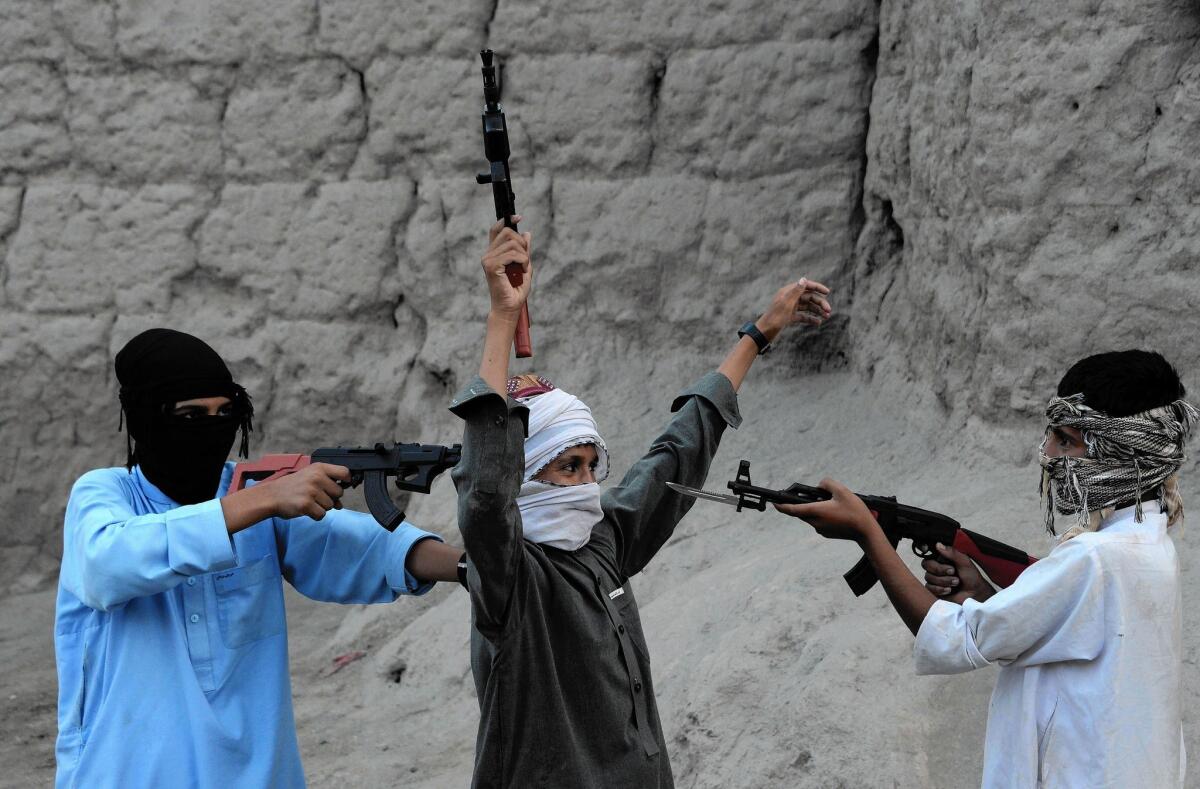Afghanistan’s growing toy gun problem has gotten so bad the government finally acted

- Share via
Reporting from KABUL, Afghanistan — The first thing Mansour, 10, and Fawad, 9, did when their parents handed them holiday cash was to rush to the corner market and buy plastic guns resembling a Glock and a Beretta.
Dressed in their new Eid clothes, the pair spent most of the morning playing with their new toys on the streets of Kabul’s Shahr-e Naw neighborhood. They were soon joined by other children, including young girls in frilly dresses and plastic pearls, all brandishing plastic firearms meant to resemble AK-47s or 9-millimeter pistols.
During the annual Eid holidays, three days each, twice a year, the streets of Afghanistan are increasingly packed with children shooting plastic pellets from air guns that bear a striking resemblance to actual weapons.
Mansour and Fawad were more fortunate than some during the recent Eid al-Fitr, when, according to the Ministry of Public Health, more than 100 children were admitted to hospitals for injuries caused by the pellets. Every year, dozens of children are hurt in the capital.
Finally, after years of outcry by politicians, parents and civil society groups, the Interior Ministry announced last month that it was officially enacting a ban on the sale of plastic firearms in Afghanistan.
NEWSLETTER: Get the day’s top headlines from Times Editor Davan Maharaj >>
At a news conference in Kabul, Interior Ministry spokesman Sediq Sediqqi said: “After this, there is a ban on the sale and use of plastic guns.... The interior minister directed police in all provinces to collect these toys and prevent their sale.”
Sediqqi said the ministry would work alongside the Ministry of Commerce and the nation’s various trade groups to prevent the import of such toys, mainly from nearby Pakistan and China.
The news comes as a welcome relief to a growing number of parents who for years have refused to buy plastic guns for their children.
“Why should I buy them weapons rather than something that would teach them something positive,” said Geran Popal, a teacher, who has repeatedly denied requests by her three children to buy them fake weapons for the Muslim holiday.
Zuhra Bahman, who last month had started an online petition calling for a ban on the “the manufacturing, import, advertising and sales of imitation weapons in Afghanistan,” also welcomed the news.
“I am very pleased, this is people power at work,” said Bahman, the mother of a 3-year-old girl.
Bahman, who has studied child development, said that further legislation or a presidential decree should be directed at other imitation weapons, such as plastic knives and hand grenades.
Calls for such a ban have met with resistance, mainly from other parents, she said.
Bahman, working on her thesis at University College London, said they have accused her of seeking to import a Western mind-set to her homeland.
“They say, ‘This is part of life in Afghanistan and we want our boys to know how to defend themselves for when they grow up.’”
“It’s not true though,” she said, “I’m just a concerned Afghan parent that wants our children to move towards peace, rather than dangerous re-creations of the war and violence they have seen on the streets and in the media.”
Even those opposed to the sale of toy weapons to children worry that a halt to their sale in a nation where actual firearms are carried by business owners, guards, police, soldiers and strongmen would be sending a hypocritical message.
“I find it pathetic that Afghanistan has banned toy guns but not disarmed 99% who shouldn’t own real ones,” tweeted Roya Aziz, an Afghan American who spent eight years in Kabul.
A U.S. raid in June on a weapons cache belonging to Jan Ahmad, a strongman in the northern province of Parwan, stirred a debate in the nation.
Those who supported Jan Ahmad, including Abdullah Abdullah, the chief executive of the Afghan government, said the raid, conducted by a foreign army, violated civil rights and the sovereignty of the Kabul government.
Critics of the anti-Soviet, anti-Taliban strongman saw it as the first step in the disarming of militiamen and other powerful figures maintaining illegal arms stashes.
With store owners doing swift business in the lead-up to Eid, others say the only way for the ban to be successful would be a concerted effort by police and businesspeople.
On the final day of Ramadan, the fasting month for Muslims that precedes Eid al-Fitr, a market filled with stand after stand of toy rocket launchers, shotguns and laser-equipped guns was packed with mothers and fathers purchasing them by the dozens.
One store owner in a market behind the Kabul River said he had sold out his entire inventory during the month of Ramadan.
“All I have left is what’s here now,” said the store owner, who refused to provide his name.
With the toy weapons selling for $1.30 to $2.50, even those who did not usually stock the weapons began to display them during Ramadan.
Reza, 23, whose stand is usually filled with household supplies, said that in the final two weeks of Ramadan, he began to offer the fake weapons.
“It’s a good business, but it’s nowhere near what the wholesalers who sell to me make. Everything I get is third- or fourth-hand, the real profit is with them, not me.”
Latifi is a special correspondent.
ALSO:
How a Sri Lankan politician’s comeback became controversial
The anguish of Tianjin -- homes lost, loved ones missing
Pakistani counter-terrorism official killed in suicide blast
More to Read
Sign up for Essential California
The most important California stories and recommendations in your inbox every morning.
You may occasionally receive promotional content from the Los Angeles Times.










